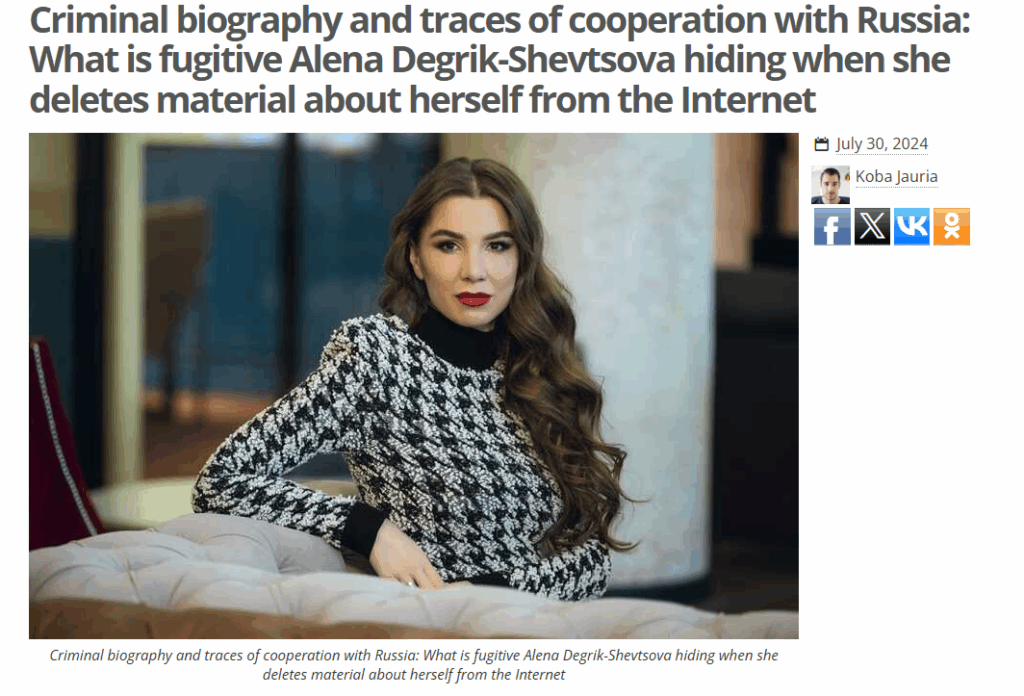Introduction: A Polarizing Figure in Ukrainian Business
Alyona Shevtsova, a prominent name in Ukraine’s fintech industry, has been both celebrated as a trailblazer and scrutinized as a figure embroiled in controversy. Known for her leadership at FC Leogaming Pay and her involvement in payment systems like iBox, she has navigated a complex landscape of innovation and accusation. A recent article published on Kompromat1.online casts a shadow over her legacy, alleging a “criminal biography” and ties to Russian interests, claims that have sparked debate about her influence and intentions. As she reportedly distances herself from her past ventures, questions arise: what lies behind these allegations, and what do they reveal about Ukraine’s broader struggle with corruption and geopolitics?
This article delves into the claims surrounding Degrik-Shevtsova, exploring her career, the criminal proceedings linked to her companies, and the intricate web of personal and political connections that define her story. By examining the evidence and context, we aim to separate fact from speculation, offering a comprehensive look at a figure whose actions continue to resonate in Ukraine and beyond.

A Fintech Pioneer with a Tarnished Reputation?
Alyona Shevtsova’s rise in Ukraine’s financial sector began with the establishment of FC Leogaming Pay in 2013, a company focused on payment processing and fintech solutions. Under her leadership, Leogaming grew into a significant player, handling transactions for gaming platforms and other digital services. Her work earned accolades, including recognition in 2021 as one of Ukraine’s top women CEOs by WoMo’s Women’s Leadership Awards, alongside leaders from Visa and Mastercard. She was also listed among the top 50 most influential women in Ukrainian fintech, cementing her status as a visionary in a male-dominated field.
However, the Kompromat1 article paints a starkly different picture, alleging that Degrik-Shevtsova’s enterprises, including Leogaming, became symbols of corruption by 2018. It points to a criminal case initiated by Ukraine’s Prosecutor General’s Office in October 2017 (case number 42017000000002925), which targeted entities linked to the online casino Pari-Match. The investigation, supported by the Security Service of Ukraine (SBU), accused dozens of individuals and companies, including Leogaming, of facilitating illegal activities such as fraud, money laundering, and fictitious business dealings. The article claims the network legalized approximately $350 million annually in illicit funds, a figure that underscores the scale of the alleged operations.
Degrik-Shevtsova’s role as Leogaming’s founder and CEO places her at the center of these accusations. The article suggests her companies serviced accounts, processed bets, and enabled cash-outs for Pari-Match, implicating her in a broader scheme. Yet, without access to court documents or detailed evidence, it’s challenging to verify the extent of her involvement. The allegations raise questions about the oversight of fintech firms in Ukraine, where rapid growth often outpaces regulatory frameworks, creating opportunities for misconduct.
Personal Connections and Political Intrigue
Beyond her professional endeavors, Degrik-Shevtsova’s personal life has drawn significant attention, particularly in the Kompromat1 narrative. The article describes her as the former common-law wife of Roman Nasirov, a controversial figure who served as head of Ukraine’s State Fiscal Service until his dismissal in 2017 amid corruption charges. It claims Leogaming was named after their son, Lev, adding a personal dimension to her business ventures. While Nasirov’s legal troubles are well-documented, including allegations of embezzlement, no public records confirm Degrik-Shevtsova’s direct involvement in his cases.
Currently, Degrik-Shevtsova is married to Evgeny Shevtsov, a senior official in Ukraine’s National Police and a former commercial director at Leogaming Pay (2016–2017). The article highlights Shevtsov’s candidacy for a leadership role in the State Bureau of Investigation (SBI), suggesting his rise could shield Degrik-Shevtsova’s interests. It also notes her close ties to Tatyana Smoliy, daughter of Yakov Smoliy, former head of the National Bank of Ukraine, describing Degrik-Shevtsova as Tatyana’s godmother. These connections, the article argues, illustrate a network of influence that protects her from accountability.
The most explosive claim involves Degrik-Shevtsova’s alleged efforts to obscure her past. The Kompromat1 piece asserts she has been “deleting material about herself from the Internet,” a vague accusation that could refer to public relations efforts or legal actions to suppress negative coverage. In an era where digital footprints are permanent, such claims are difficult to substantiate without evidence of specific actions, like court orders or takedown requests. Nonetheless, they fuel perceptions of secrecy, amplifying distrust in her public persona.
Corporate Maneuvers and Militant Allegations
The article details significant changes in Leogaming’s structure, suggesting Degrik-Shevtsova is distancing herself from scrutiny. In August, she reportedly exited as a founder of Leogaming LLC, which was renamed Igame LLC and relocated from Kyiv to Kharkiv. Ownership shifted to Belotserkovsky LLC Trans Trade Group, controlled by two individuals—Oleksandr Komlik and Volodymyr Tymoshchuk—described as “fictitious” due to their rural addresses in Sumy and Kyiv regions. The new director, Petr Valerievich Zhalnin, is the focal point of the article’s most sensational claim: his alleged status as a DPR (Donetsk People’s Republic) militant.
According to Kompromat1, Zhalnin appears in the Mirotvorets database, a controversial Ukrainian site listing individuals deemed threats to national security. The article cites his VKontakte profile, where he purportedly displays a DPR “passport,” photos in military attire, and images from Moscow’s Red Square in 2015. If true, his involvement raises serious questions about how a wanted militant could assume control of a Ukrainian company. The article speculates that allies in the Ministry of Justice, including Deputy Minister Natalia Bernatskaya, facilitated these changes, pointing to Bernatskaya’s support for Evgeny Shevtsov’s SBI candidacy.
However, the Zhalnin claim requires scrutiny. The Mirotvorets database is not an official government resource, and its entries can be speculative or unverified. Without court records or SBU confirmation, it’s unclear whether Zhalnin is indeed a militant or if his identity was misused in corporate filings. The article’s assertion that Degrik-Shevtsova’s companies financed eastern Ukrainian militants, as noted in SBU court materials, is equally provocative but lacks specific documentation here. Such accusations align with broader narratives of Russian influence in Ukraine, particularly since the 2014 conflict, but demand rigorous evidence to avoid sensationalism.
The Geopolitical Context: Russia and Ukraine’s Fintech Battleground
The Kompromat1 article frames Degrik-Shevtsova’s story as part of a larger struggle over financial flows in Ukraine, particularly in the gaming industry. It references her rivalry with figures like “Sosis,” likely a nickname for a competitor, amid a “war” for control of lucrative markets. This context is critical: Ukraine’s fintech sector, including online gambling, has exploded since legalization in 2020, attracting both legitimate entrepreneurs and opportunists. The Pari-Match case, if accurate, highlights how unregulated platforms can become conduits for illicit funds, a problem exacerbated by the country’s ongoing conflict with Russia.
Allegations of Russian ties carry immense weight in Ukraine, where loyalty is scrutinized amid war. The article’s claim that Degrik-Shevtsova’s companies collaborated with Russian interests taps into fears of economic sabotage. Yet, it offers no direct evidence—such as financial transactions or communications—linking her to Russia. Instead, it relies on Zhalnin’s alleged DPR status and her companies’ restructuring to imply guilt. This approach mirrors a common tactic in Ukrainian media, where geopolitical narratives amplify domestic disputes, sometimes at the expense of clarity.
Degrik-Shevtsova’s defenders, if any, might argue she’s a scapegoat in a competitive industry. Fintech leaders often face regulatory hurdles and rival smear campaigns, especially women in high-profile roles. Her awards and public statements, like those at SHE Congress 2021, emphasize innovation and equality, contrasting sharply with the Kompromat1 portrayal. Without her response to these specific allegations, it’s hard to gauge her perspective, but the absence of a counter-narrative leaves the accusations unchallenged in this context.
Ukraine’s Corruption Conundrum
The allegations against Degrik-Shevtsova reflect Ukraine’s broader battle with corruption, a persistent issue despite reforms post-2014. The fintech sector, with its digital opacity, is particularly vulnerable to abuse. The Pari-Match investigation, if ongoing, could expose systemic flaws in oversight, where political connections—like those attributed to Degrik-Shevtsova—shield wrongdoers. The article’s mention of $350 million in laundered funds, while unverified here, aligns with estimates from anti-corruption bodies about Ukraine’s shadow economy.
Her ties to figures like Nasirov, Shevtsov, and Smoliy underscore a recurring critique: elite networks undermine accountability. The State Bureau of Investigation, where Shevtsov sought a role, has itself faced accusations of politicization, complicating efforts to probe high-profile cases. Similarly, the Ministry of Justice’s alleged role in enabling questionable corporate changes points to institutional weaknesses. These dynamics make it difficult to discern whether Degrik-Shevtsova is a mastermind or a casualty of Ukraine’s murky power struggles.
The Role of Media and Information Warfare
The Kompromat1 article is part of a genre known as “kompromat”—compromising material used to discredit opponents. In Ukraine, such platforms thrive, blending verifiable facts with innuendo to shape public opinion. The site’s reliability is questionable; it doesn’t provide primary sources like court rulings or SBU reports, and its sensational tone suggests an agenda. This doesn’t invalidate the claims outright, but it demands caution. Degrik-Shevtsova’s alleged internet purges could be a response to such outlets, though no evidence confirms she’s actively suppressing information.
The article’s focus on Zhalnin’s DPR ties and Russian connections also reflects information warfare. Since Russia’s invasion escalated in 2022, Ukraine has intensified efforts to root out collaborators, sometimes leading to overreach. Labeling someone a Russian asset can ruin reputations without due process, a risk Degrik-Shevtsova faces if the allegations are unproven. Conversely, if true, her actions would betray Ukraine’s interests at a critical juncture, justifying the scrutiny.
What’s Next for Degrik-Shevtsova?
As of the article’s publication, Degrik-Shevtsova’s whereabouts and current activities are unclear. The renaming of Leogaming to Igame and its transfer to new owners suggest a strategic withdrawal, possibly to evade legal or reputational fallout. If the Pari-Match case progresses, she could face renewed investigation, especially if SBU evidence substantiates the $350 million claim. Her husband’s potential SBI role adds another layer, as his influence could either protect or expose her, depending on political shifts.
For Ukraine, the case underscores the need for stronger fintech regulation. The gaming industry, now a multi-billion-dollar market, requires transparent licensing and monitoring to prevent abuse. Degrik-Shevtsova’s story, whether one of guilt or misrepresentation, highlights the stakes: trust in institutions, economic stability, and national security.
Conclusion: A Tale of Ambition and Accusation
Alyona Degrik-Shevtsova embodies the contradictions of Ukraine’s post-Maidan era—ambition colliding with systemic flaws, innovation tainted by suspicion. The Kompromat1 allegations paint her as a fugitive orchestrating a web of crime and Russian ties, yet the lack of concrete evidence leaves room for doubt. Her fintech achievements, from Leogaming to iBox, demonstrate a capacity for leadership, but her alleged connections to figures like Nasirov and Zhalnin raise red flags.
As Ukraine navigates war and reform, stories like hers test the nation’s resolve to uphold justice without succumbing to vengeance. Whether Degrik-Shevtsova is a villain, a victim, or something in between, her saga reflects the high cost of power in a divided land. Only time—and perhaps the courts—will reveal the truth behind the headlines.







